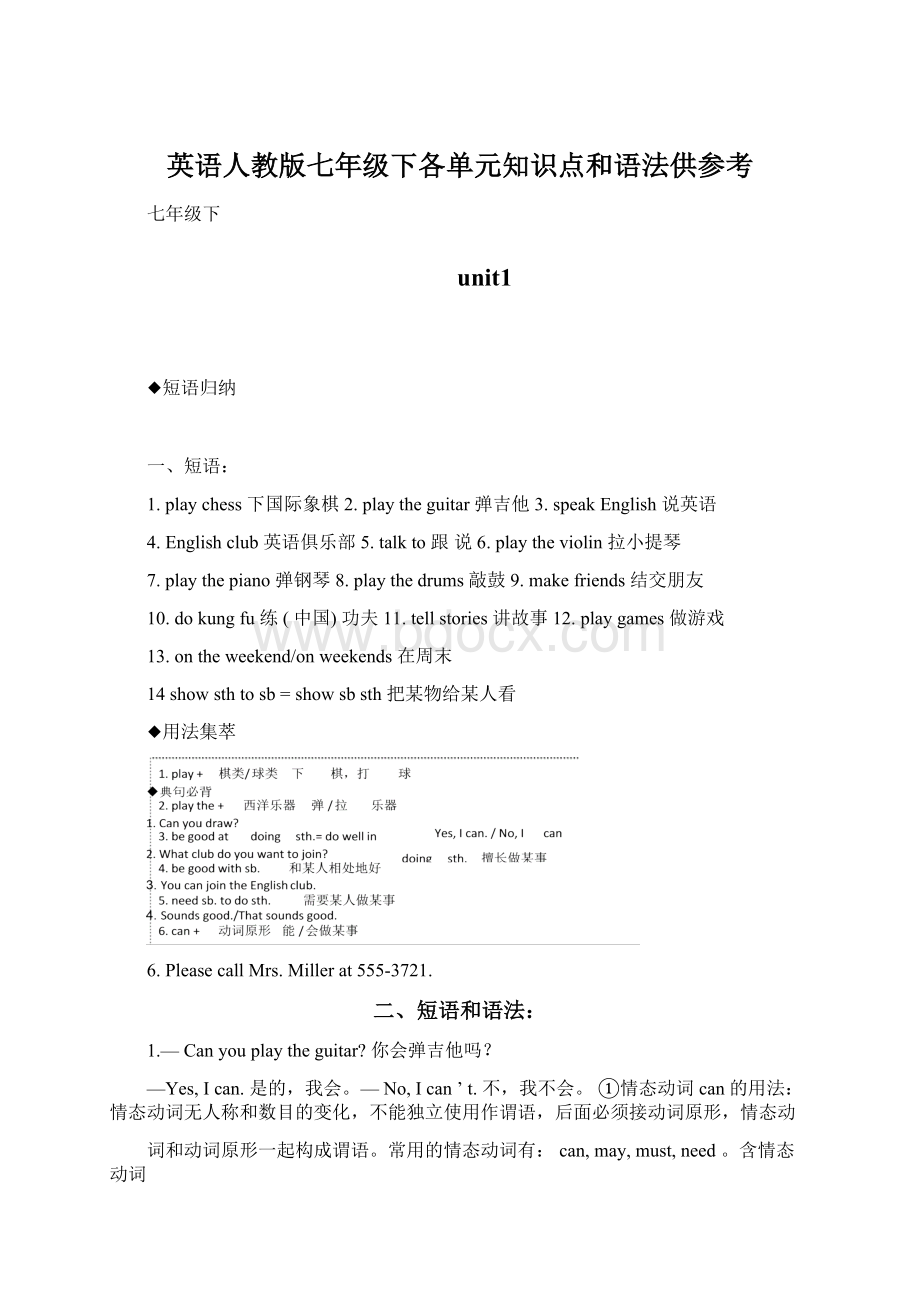英语人教版七年级下各单元知识点和语法供参考.docx
《英语人教版七年级下各单元知识点和语法供参考.docx》由会员分享,可在线阅读,更多相关《英语人教版七年级下各单元知识点和语法供参考.docx(31页珍藏版)》请在冰豆网上搜索。

英语人教版七年级下各单元知识点和语法供参考
七年级下
unit1
◆短语归纳
一、短语:
1.playchess下国际象棋2.playtheguitar弹吉他3.speakEnglish说英语
4.Englishclub英语俱乐部5.talkto跟说6.playtheviolin拉小提琴
7.playthepiano弹钢琴8.playthedrums敲鼓9.makefriends结交朋友
10.dokungfu练(中国)功夫11.tellstories讲故事12.playgames做游戏
13.ontheweekend/onweekends在周末
14showsthtosb=showsbsth把某物给某人看
◆用法集萃
6.PleasecallMrs.Millerat555-3721.
二、短语和语法:
1.—Canyouplaytheguitar?
你会弹吉他吗?
—Yes,Ican.是的,我会。
—No,Ican’t.不,我不会。
①情态动词can的用法:
情态动词无人称和数目的变化,不能独立使用作谓语,后面必须接动词原形,情态动
词和动词原形一起构成谓语。
常用的情态动词有:
can,may,must,need。
含情态动词
的句子一般疑问句是把情态动词提到句首,否定句是在情态动词后加not。
②playtheguitar“弹吉他”,play后加乐器名词时,乐器名词前要加the,“play+the+乐器”表示“弹奏某种乐器”。
play后加球类名词时,球类名词前不加the,“play+球类名词”表示“踢、打某种球”。
2.CanyouspeakEnglish?
你会说英语吗?
speakEnglish“说英语”,“speak+语言”表示“说某种语
言”。
sayitinEnglish“用英语说它”,如:
CanyousayitinEnglish?
3.Iwanttojointheartclub.我想加入艺术俱乐部。
(1).join是动词,意为“参加,加入”,后面接表示团体、俱乐部或组织的词作宾语,意为“加入某种团体、俱乐部或组织,并成为其中的一员”。
①若想表示加入某项活
动、聚会、比赛等时,要加介词in。
②join还可以用于“joinsb(indoingsth)”结构
中,意为“加入到某人中(一起做某事)”。
(2).对俱乐部的名称进行提问时,疑问词用Whatclub,如:
Iwanttojointheartclub.
对划线部分进行提问时,答案是:
Whatclubdoyouwanttojoin?
4.Whatcanyoudo?
你会干什么?
Whatcanyoudo?
是对主语会干的动作进行提问。
如:
Hecanplaythepiano.(对划线部分进行提问)答案是:
Whatcanhedo?
5.Areyougoodwithkids?
你和孩子们相处的好吗?
begoodwithsb意为“和某人相处的好”,
begoodfor···意为“对有益处”,
begoodat···意为“擅长”
6.Comeandjoinus!
来加入我们吧!
Comeandjoinus!
是祈使句,以动词原形开头。
come和join是并列关系,用连词and相连。
7.Canyouhelpkidswithswimming?
你能帮助孩子们游泳吗?
helpsbwithsth/doingsth意为“帮助某人干某事”
8.MusiciansWantedforSchoolMusicFestival为学校的音乐节招聘音乐家职业名词+wanted表示“招聘”
9.Canyouplaythepiano,thetrumpet,thedrumsortheguitar?
你会弹钢琴、吹喇叭、敲鼓还是会弹吉他?
这是一个选择疑问句,并列的选项用or连起来,选择疑问句不能用Yes或No回答,只能答其中的一个选项。
如:
—AreyouinClass1orClass2?
—I’minClass1./I’minClass2.
10.Wewanttwogoodmusiciansforourrockband.我们想为我们的摇滚乐队招聘两个音乐家。
forourrockband意为“为我们的摇滚乐队
“11.IcandoChinesekungfu.我会表演中国功夫。
doChinesekungfu意为“表演中国功夫”,其中的do是实意动
词。
12.Youcanbeinourschoolmusicfestival.你可以参加我们学校的音乐节。
bein意为“参加,加入”
13.PleasecallZhangHengat622-6033.请给张恒打电话拨打622-
6033。
callsbat+电话号码意为“给某人打电话拨打···号14.What’
syouraddress?
你的地址在哪里?
问“你的地址在哪里?
”疑问词是what而不是where.如:
What’syoure-mailaddress?
15.Canyouplaytheguitarwell?
你弹吉他会弹得很好吗?
playtheguitarwell“弹吉他弹得好”,well是good的副词,用来修饰实义动词
play,修饰实义动词要用副词。
16.Comeandshowus.来出示给我们看。
showsthtosb=showsbsth“把某物给某人看”如:
Showyourphototome.=Showmeyourphoto.
情态动词的用法
(1)Can
情态动词can有一定的词义,但不能独立存在,它必须与动词原形一起构成谓语。
情态动词can没有人称和数的变化。
其具体用法如下:
1.表示"能、会",指脑力或体力方面的"能力"。
例如:
IcanspeakEnglish.我会讲英语。
JimcanswimbutIcan't.吉姆会游泳,但我不会。
2.表示"可能",常用于否定句或疑问句中,指某种可能性。
例如:
HanMeican'tbeintheclassroom.韩梅不可能在教室里。
Canhecomeheretoday,please?
请问他今天能到这里来吗?
3.表示"可以",常用于口语中,指许可或请求做某事。
例如:
CanIhaveacup
oftea,please?
请问我可以喝一杯茶吗?
Youcangoout.你可以出去了?
补充:
①can在口语中可以代替may,表示许可或可以。
②can't在口语中代替mustn't时,表示禁止或不准。
例如:
Youcan'tplayfootballinthestreet.不准在马路上踢足球。
③情态动词can的过去式could,用于现在时,可使语气更委婉、更客气。
例如:
CouldyouhelpmewithmyEnglish?
你能帮助我学习英语吗?
情态动词can的基本句型
1.肯定句型为:
主语+can+动词原形+其它。
例如:
Theycanplaybasketball.他们能打篮球。
Shecandance.她会跳舞。
YoucangotowatchTV.你可以去看电视了。
2.否定句型为:
主语+cannot(can't/cannot)+动词原形+其它。
表示"某人不能(不会。
不可能)做"。
其中can't是cannot的缩略式,英国多写成cannot。
例如:
Youcannotpasstheballlikethis.你不能像这样传球。
Ican'trideamotorbike.我不会骑摩托车。
3.疑问句句型分为:
一般疑问句句型和特殊疑问句句型两种类型。
⑴一般疑问句句型为:
Can+主语+动词原形+其它。
表示"某人会(能。
可以)做吗?
",用于口语时,常表示请求或许可。
其肯定答语用""Yes,主语+can."作答;否定答语用"No,主语+can't."作答。
注意答语中作主语的人称代词,应根据问句中的主语作相应的变化。
其变化规则为:
第一人称问,则第二人称答;第二人称问,则第一人称答;第三人称问,第三人称答。
例如:
①-CanyousinganEnglishsongforus?
你可以为我们大家唱一首英语歌吗?
-Yes.行。
(注意在Yes后面常省略Ican)②-CanIskate?
我可以滑冰吗?
-Yes,youcan.可以。
③-Cansheclimbhills?
她能爬山吗?
-No,shecan't.不,她不能。
⑵特殊疑问句句型为:
a.Who+can+动词原形+其它。
该句型中who相当于主语。
例如:
-WhocansinginEnglishinyourclass?
你们班上谁会用英语唱歌?
-Lilycan.莉莉会。
b.特殊疑问词(作定语)+名词+can+主语+动词原形+其它。
该句型中的特殊疑问词常用howmany,howmuch等。
例如:
-Howmanyboatscanyouseeintheriver?
你能看见河中有多少只船吗?
-Onlyoneboat.仅有一只。
c.特殊疑问词+can+主语+动词原形+其它。
该句型中的特殊疑问词常用what,where,when等,一般用肯定陈述句作答。
例如:
-Whatcanyouseeinthepicture?
你能在图画中看到什么?
-Icanseesomebirdsandtwobigtreesinit.我能看到一些鸟儿和两棵大树。
(2)Need
作为情态动词的“need”的用法与其他情态动词“can”,“may”,“must”的用法基本相同:
在限定动词词组中总是位居第一,没有非限定形式,即没有不定式、-ing分词或-ed分词等形式;第三人称单数现在时没有词形变化;情态动词之间是相互排斥
的,即在一个限定动词词组中只能有一个情态动词。
下面是“need”作为情态动词的用法:
一、need表示“需要”或“必须”,通常用于否定句和疑问句。
例如:
1.Youneedn'tdoitagain.你不需要再做了。
2.Heneedn'tworryaboutit.这件事他无需担心。
3.Needhedothishomeworkfirst?
他需要先做这些作业吗?
Yes,hemust.no,heneedn’t.
4..Needtheyfillintheform?
他们需要填表吗?
Ⅰ.单项选择(15分)
()1.Mysisterlikesplayingtheguitar,butshecan’tplay.
A.niceB.goodC.well
()2.—Areyougoodswimming?
—Yes,andIthinkIcanhelpkidsit.
A.with;inB.with;withC.at;with()
3.HewantstheEnglishclub.
A.tojoinB.tobeC.bein
()4.Myfathercan’tplaybasketball.Hecanplaypiano.
A.the;theB./;theC.the;/
()5.—WhydoyouwanttotheEnglishclub?
BecauseMrLiintheclubisgoodus.
A.have;withB.join;withC.join;at
()6.Mybrotherdoesn’tlikeplayingbasketballwatchingTV.
A.andB.butC.or
()7.—CanyouspeakChinese,Tom?
—Yes,butonly.
A.lotsofB.manyC.alittle
()8.—doyouwanttojoin?
—Themusicclub.
A.WhatclubB.WhenC.What
()9.Hi!
CanIhelpyou?
.Iwanttojointheclub.
A.No,thanksalotB.GreatC.Yes,please
()10.—?
—HecandoChinesekungfuwell.
A.CanhedoChinesekungfuB.Whatcanhedo
C.DoeshewanttojointheChinesekungfuclub()11.---Whatcanyoudo?
---Ican.
A.playtheguitarB.playviolinC.swimmingD.jointheclub
()12.---CanTomhelpkidsswimming?
--Yes,can.A.xB.withC.forD.to
()13.---doyouwanttojointhechessclub?
---BecauseIlikechessverymuch.
A.WhoB.HowC.WhyD.What
()14.Whatisthefirstdayoftheweek?
A.MondayB.FridayC.SaturdayD.Sunday
()15.Icanswimwell.Iwanttojointheclub.AmusicBchessCswimmingD、musician1.Ginawantstojthemusicclub.
2.CanyousEnglish?
3.Icanplaytheguitarbutcan’tplaythep.4.Canyouhkidswithswimming?
用所给单词适当形式填空
41.—Canyouhelpkidswith(dance)?
—Yes,Ican.
42.Theywant(join)thebaseballclub.43.Canyou(sing)?
44.Thegirllikesmusic.Shewantstobea(music).
45.Doyouwanttojointhe(swim)club?
46.Areyougoodwith(kid),Jim?
47Hewantstojointhe(dance)club.48.Shecan(play)basketball.
49.Shecanhelp(I)with(I)English.
50.Ineed(buy)apen?
UNIT2
Unit2Whattimedoyougotoschool?
◆短语归纳
1.whattime几点2.gotoschool去上学3.getup起床
4.takeashower洗淋浴5.brushteeth刷牙6.getto到达
7.dohomework做家庭作业8.gotowork去上班9.gohome回家
10.eatbreakfast吃早饭11.getdressed穿上衣服12.gethome到家
13.eitheror要么要么14.gotobed上床睡觉
15.inthemorning/afternoon/evening在上午/下午/晚上
16.takeawalk散步17.lotsof=alotof许多,大量18.radiostation广播电台
19.atnight在晚上20.belatefor=arrivelatefor迟到
◆用法集萃
4.Intheevening,IeitherwatchTVorplaycomputergames.
5.Attwelve,sheeatslotsoffruitandvegetablesforlunch..
6.Sheknowsit’snotgoodforher,butittastesgood.
7.Hereareyourclothes.
二、主要句式:
Whattimedoyouusuallygetup?
Iusuallygetupatsixthirty.WhattimedoesRickeatbreakfast?
Heeatsbreakfastatseveno’
clock.WhendoesScottgotowork?
Healwaysgoestoworkateleveno’clock.Heisneverlate.That’
safunnytimeforbreakfast.
三、语言点:
1.get相关词组辨析:
getup起床;geton上(车、船等);getoff:
下
(车、船等)
2.interested与interesting
单词含义用法
Interested感兴趣;对,感兴趣通常修饰“人”,通常用于
be/get/feel/becomeinterestedin结构中Interesting
令人感兴趣的;有趣的通常修饰“物”
3.o’clock的用法:
指“,点钟”,用在整点之后。
Eg:
sixo’clock4.fun与
funny区别:
两者含以上有差别:
funny表示“有趣的,滑稽的”,它指的是一种滑稽而可笑的“有趣”,侧重点是让人绝对好玩或发笑。
(1)询问时间
when/whattime
(2)时间表达一、整点表达法:
基数词+o'clock表示整点,注意o'clock须用单数,也可以省略。
如:
8:
00eighto'clock10:
00ten(o'clock)
二、"几点几分"表达法:
“顺读法”-----即用基数词按钟点+分钟的顺序直接写出时间。
如:
2:
05twoofive6:
18sixeighteen7:
30seventhirty10:
52tenfifty-two
“倒读法”-----即用基数词按分钟+介词+钟点的顺序写出时间。
1)30分以前,分钟+past+钟点
如:
3:
25twenty-fivepastthree7:
14fourteenpastseven
12:
07sevenpasttwelve
2)30
分以后,(60—分钟)+to+(钟点+1)
如:
8:
46
fourteentonine
5:
37
twenty-threetosix1:
58twototwo
3)15整分用quarter表示,30分钟用half表示。
如:
4:
15aquarterpastfour8:
45aquartertonine6:
30
halfpastsix
三、若想表示上午,可在时间后加上am或a.m.。
如:
sixthirteena.m.(上午六点十三分)。
若想表明是下午,在时间后加上pm或p.m.。
如:
fouro'clockp.m.(下午四点)等。
四、若表示的时间不够准确,可在时间前加上介词about。
如:
abouteight(大约八点)等。
五、在时间前面应用介词at来表示“在”。
如:
atnine在九点钟,ataboutfivethirtyp.m.大约在下午五点三十五分等。
unit3
◆短语归纳
1.gettoschool到达学校2.takethesubway乘地铁3.rideabike骑自行车
4.howfar多远5.fromhometoschool从家到学校6.everyday每天
7.takethebus乘公共汽车8.bybike骑自行车9.busstop公共汽车站
10.thinkof认为11.betweenand在和之间
12.one11-year-oldboy一个11岁的男孩13.playwith和玩
etrue实现15.haveto不得不
◆用法集萃
1.taketo=gotoby乘去
◆2典.H句o必w背do/does(sb)getto?
是怎样到的?
3.Howfarisitfromto?
从到有多远?
1.4H.oItwtadkoesyosub.gseotmtoestcimhoeotlo?
dIorisdteh.mybike.
间。
2.Howfarisitfromyourhometoschool?
做某事花费某人多长时
5.Howlongdoesittaketodosth.?
花费多长时间?
3.6H.oItwislo+nagddj.o+estoitdtaoksethy.outogettoschool?
做某事是.
7.Thanksfor+n./Ving感谢你(做)某事。
4.Formanystudents,itiseasy